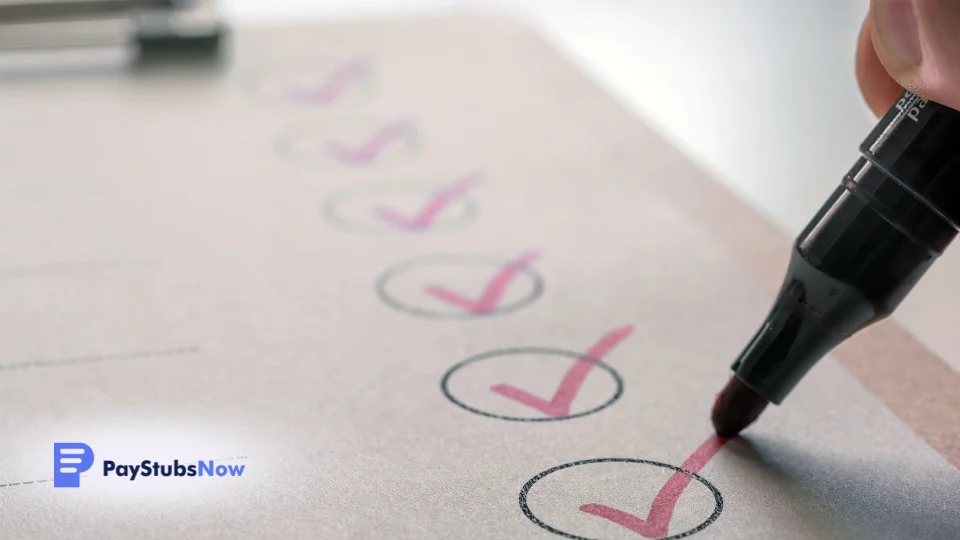HR Compliance: What Small Business Owners Need to Know
Managing a business is no small feat, especially when it comes to navigating HR compliance. From understanding employee classification to keeping up with payroll, benefits, and workplace safety regulations, there are a myriad of guidelines to follow and potential pitfalls to avoid.
This comprehensive guide will demystify the complexities of HR compliance and offer actionable advice to ensure your business aligns with current regulations.
We will also explore how tools like Paystubsnow can streamline your financial document processes and support your HR efforts.
Let's dive in and simplify HR compliance for your small business!
Key Points Regarding HR Compliance:
- HR compliance is crucial for small business owners. By following applicable laws regarding the HR department, they can avoid legal issues and operational setbacks.
- Key areas of HR compliance include regulatory, statutory, contractual, and union law compliance.
- Essential HR laws cover labor practices, discrimination, health and safety, medical leave, privacy, and employee benefits.
- Common HR compliance challenges include staying updated with changing laws, maintaining accurate documentation, and managing employee relations.
- Utilizing resources like Paystubsnow can help streamline HR processes and ensure compliance with financial documentation requirements.
What Is HR Compliance?
HR compliance refers to the adherence to federal, state, and local labor laws and regulations by the governing workplace practices. This includes accurate employee classification, fair payroll management, offering employee benefits, and ensuring workplace safety. It's essential for minimizing legal risks and creating a stable, productive work environment.
Key Areas of HR Compliance

Understanding the key areas of HR compliance is crucial for effectively managing your workforce and staying within legal boundaries. Let's explore these areas below.
Regulatory Compliance
Regulatory compliance ensures that your business adheres to federal, state, and local laws determined by government agencies regulating labor practices. This covers various mandates, from minimum wage laws to workplace discrimination regulations.
Staying compliant minimizes legal risks and creates a positive work environment. Small business owners should proactively understand these laws, utilizing resources like employee handbooks and compliance audits to stay updated.
Statutory Compliance
This form of compliance involves adhering to the laws and regulations that govern how businesses operate, impacting everything from minimum wage to employee benefits. Small business owners must stay updated on changes in labor legislation to avoid hefty fines and legal consequences.
Proactively addressing statutory requirements, such as timely tax payments and accurate record-keeping, is crucial.
Contractual Compliance
Contractual compliance ensures that your business adheres to the specific terms and conditions outlined in contracts with employees, independent contractors, and third-party vendors. This includes respecting confidentiality agreements, non-compete clauses, and other contractual obligations.
Mishandling these can lead to legal troubles and disrupt operations. Regularly review these contracts and consult legal experts to ensure compliance. Moreover, maintaining clear communication with your workforce about their contractual rights and responsibilities can help prevent misunderstandings.
Union Law Compliance
Compliance with union laws ensures that you respect your employees' right to organize and bargain collectively. This means refraining from practices like questioning union supporters, retaliating against union activities, or not bargaining in good faith, as outlined by the National Labor Relations Act (NLRA).
Small business owners must navigate these rules carefully to avoid legal entanglements and create a safe and fair workplace. When in doubt, seek guidance from HR professionals or legal experts to ensure all union-related compliance requirements are adequately met.
The Importance of HR Compliance
HR compliance is not just about avoiding fines and penalties—it also pertains to creating a healthy and positive work environment. By ensuring your HR practices are compliant with applicable laws, you can:
- Minimize Legal Risks: Staying compliant helps businesses avoid costly lawsuits, fines, and other legal repercussions.
- Enhance Employee Well-Being: A compliant environment ensures that employees feel valued and safe, promoting a positive workplace culture.
- Boost Productivity: Employees who operate in a well-regulated, supportive environment can improve their job satisfaction and performance.
- Attract and Retain Talent: Companies known for their compliance and fair practices are more likely to attract top talent and retain valuable employees.
- Drive Business Growth: HR compliance is a cornerstone for strategic growth, as it lays a stable foundation for scaling operations.
Essential HR Compliance Laws and Regulations

It's imperative to understand the essential laws governing your HR processes. Let's examine the critical regulations that every small business owner must know.
Labor Laws
The Fair Labor Standards Act (FLSA) covers rules for minimum wage, overtime pay, and recordkeeping. Compliance with these laws ensures a fair and equitable workplace and prevents issues like wage theft.
As a business owner, you must familiarize yourself with both federal and state-specific labor regulations, as they can vary. Additionally, final paycheck laws dictate the timely payment of wages upon termination, a critical aspect of avoiding legal penalties.
Employment Discrimination Laws
These laws are essential to creating an equitable workplace. Under these laws, discrimination based on race, color, religion, sex, national origin, age, disability, or genetic information is prohibited. This means hiring decisions, terminations, job listings, promotions, and employee salaries must remain free of bias.
For instance, under the Equal Pay Act, equal remuneration is given to men and women workers to prevent discrimination on the grounds of gender. Ensure your hiring managers are trained to avoid discriminatory questions and practices.
Health and Safety Regulations
Ensuring a safe workplace is not just good practice; it's a legal requirement under the Occupational Safety and Health Act (OSHA). Small business owners must maintain a hazard-free environment and comply with OSHA standards to protect employees. This includes conducting regular safety inspections, providing necessary training, and keeping detailed records of any incidents.
A proactive approach to health and safety regulations minimizes risks and builds a culture of care and responsibility within your organization.
Family and Medical Leave Laws
The Family and Medical Leave Act (FMLA) mandates up to 12 weeks of unpaid, job-protected leave for eligible employees, allowing them to handle significant family or medical needs without fear of job loss.
Compliance with the FMLA is crucial for small businesses, ensuring you respect employee rights while maintaining legal standing. Regularly review your leave policies, communicate them clearly to your staff, and track leave accurately to prevent potential compliance issues.
Privacy Regulations
Ensuring the confidentiality and secure storage of employees' personal and health information is crucial. Under regulations like GDPR and HIPAA, businesses must adopt robust measures to prevent data breaches and misuse. This includes implementing secure data storage and access systems, training employees on data privacy practices, and regularly updating privacy policies.
Non-compliance can result in severe penalties and damage to your business's reputation. Staying proactive in privacy management helps build trust and compliance.
Employee Benefits Regulations
Small business owners must be vigilant about employee benefits. Complying with regulations like the Affordable Care Act ensures that employees receive essential health benefits. In addition to health coverage, retirement plans and other perks must align with federal and state laws.
Failing to meet these standards can result in hefty penalties. Consistently review and update your benefits offerings to stay compliant and keep your workforce satisfied and secure.
HR Compliance Issues and Challenges
Navigating the landscape of HR compliance can be particularly challenging for small business owners. Here are some common issues and challenges you may face:
- Keeping Up With Changing Laws: Labor laws and regulations frequently change, making it crucial to stay updated to avoid non-compliance.
- Employee Classification: Incorrectly categorizing workers as independent contractors instead of employees can result in serious legal and financial consequences.
- Payroll Management: Accurate payroll processing is vital. Mistakes can result in fines and dissatisfied employees.
- Benefits Administration: Ensuring compliance with health benefits, retirement plans, and other employee benefits can be complex.
- Workplace Safety: Compliance with OSHA and other health and safety regulations is essential to avoid penalties and ensure a safe work environment.
- Documentation and Record Keeping: Maintaining thorough and accurate records of employee details, performance, and interactions is both a legal requirement and best practice.
- Handling Discrimination Claims: Ensuring your HR practices prevent discrimination and managing any claims effectively is crucial to maintaining a fair workplace.
HR Compliance Best Practices

Now, let's look at some best practices to help keep your business on track with thorough HR compliance.
Stay Informed on Labor Laws
Keeping up with federal, state, and local labor laws is crucial for maintaining a compliant workplace. Regularly check for updates on relevant legislation like the Fair Labor Standards Act (FLSA), Occupational Safety and Health Act (OSHA), and others.
Subscribe to labor law newsletters, attend seminars, or consult with HR professionals. Staying informed helps you avoid legal pitfalls and ensures your policies are up to date, protecting both your business and employees.
Maintain and Update Employee Handbooks
The employee handbook is critical to any company’s HR compliance strategy. Keep it updated with the latest regulations, company policies, and procedures. This resource should be easily accessible to employees and provide clear guidelines on everything from workplace conduct to benefits.
Regular reviews and updates ensure the handbook remains relevant and compliant, reflecting any changes in the law or your business practices. Make it a living document that grows with your company and creates a transparent work environment.
Conduct Regular Audits
Regular audits of HR practices and records are essential for maintaining compliance. Periodic internal audits help identify and rectify any discrepancies, ensuring all policies adhere to current laws. This includes verifying employee classifications, wage records, and benefits administration.
Additionally, staying proactive by reviewing and updating your HR processes can prevent potential compliance issues before they escalate. Regular audits keep your business in check and build a trustworthy workplace culture.
HR Compliance Checklist

To simplify keeping track of HR compliance requirements, we've compiled a checklist for you to use as a resource. Here are the important compliance tasks to keep in mind:
- Regularly review and revise your employee handbook to reflect the latest policies and legal requirements.
- Ensure all employee records, including personal information and employment history, are up-to-date and securely stored.
- Conduct regular training sessions to educate employees and managers on compliance-related topics such as anti-discrimination, harassment policies, and workplace safety.
- Review your HR practices and records periodically to identify any compliance gaps and take corrective actions as needed.
- Clearly define roles and responsibilities to meet regulatory requirements and avoid misclassification issues.
- Perform thorough background checks on potential hires to ensure they meet your business standards and comply with legal requirements.
- Regularly assess and update employee benefits packages to ensure compliance with regulations and competitive standards.
- Clearly outline and follow proper termination procedures to minimize legal risks and ensure fair treatment of employees.
Power Your HR Department With Paystubsnow
Understanding and adhering to all HR regulations is crucial for the health of any business. Every area demands your attention, from classification and payroll to benefits and safety. So, how can your HR department pull all this off and run as smoothly as possible?
This is where Paystubsnow comes in—to transform your compliance practices!
Paystubsnow offers reliable solutions for easily generating compliant pay stubs, W-2 forms, and 1099 forms. By automating the creation of these key financial documents, you save significant time and effort to focus on other essential HR tasks.
The platform ensures accuracy and adherence to regulations, reducing the risk of costly errors and penalties.
Simplify payroll processing, enhance record-keeping, and maintain a high standard of compliance to streamline your HR processes.

